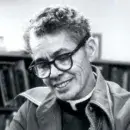
Pauli Murray
Pauli Murray was one of the most influential legal minds of the twentieth century. She attended Hunter College (B.A., 1933), Howard University School of Law (LL.B., 1944), University of California, Berkeley School of Law (LL.M., 1945), and Yale Law School (D.J.S., 1965). In addition to being a legal scholar, she was an author, poet, Episcopal priest, and an African American civil rights and women’s rights activist.
Murray was cofounder of the National Organization for Women (NOW), vice president of Benedict College in South Carolina, cofounder of the Congress of Racial Equality, an organizer of the March on Washington movement (MOWM) headed by A. Philip Randolph, the first person to teach African American Studies and Women’s Studies at Brandeis University, and the first African American woman ordained as an Episcopal priest. As one of the first jurists to theorize that the 14th Amendment’s guarantee of protection could be applied not only to race but gender, her intersectional scholarship became the cornerstone of the antidiscrimination law that undergirded both the modern civil rights and women’s movements.
Murray was also the author of numerous works, including the collection Dark Testament and Other Poems (1970), The Rights of Man Are Worth Defending (1942, with Roger N. Baldwin), States’ Laws on Race and Color (1951), and The Constitution and Government of Ghana (1961, with Leslie Rubin); as well as autobiographical works Proud Shoes: The Story of an American Family (1956) and Song in a Weary Throat: Memoir of an American Pilgrimage (1987).
Image of Pauli Murray from Carolina Digital Library and Archives.
“Murray, Pauli, 1910-1985.” Online image. UNC University Library
Creative Commons BY-SA 3.0,